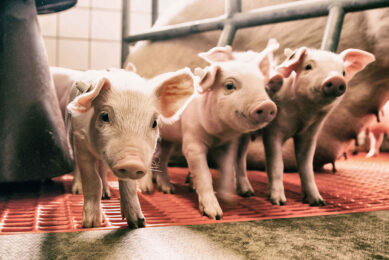How to raise a healthy piglet

Raising healthy piglets is critical for successful swine production. Piglets are particularly vulnerable in the early stages of life, requiring a balanced approach to nutrition, environment, disease prevention, and overall management. The basis for a healthy piglet starts already with a healthy sow. In order to give the piglet the best conditions for a successful start, it is important to support intestinal development as early as possible in a positive way.
1. The sow
To give the piglet the best conditions for a successful start, it is important to support intestinal development as early as possible in a positive way – preferably even before birth through the mother sow’s diet. Targeted nutrition and feeding management can have a positive effect on the quality and quantity of colostrum.
Maternal imprinting, which refers to the transfer of microbes from the sow to the neonate during birth, suckle, and early life, helps to establish the neonate’s gut microbiome and shape the development of the gut barrier. The piglet‘s immune system development and, in turn, their growth and survival are influenced by the sow‘s microbiota.
2. Colostrum intake
Piglets are born without maternal immunity. Therefore, earliest colostrum intake is essential for newborns. Due to the placental barrier, they are born without maternal antibodies. This means they do not have any protection against infections or diseases. For this reason, an immediate and adequate supply of colostrum is essential and plays a decisive role in farrowing management. However, litter sizes are increasing and the amount of colostrum per piglet may be insufficient.
Particularly the lighter piglets and those born later receive less colostrum and therefore have poorer starting conditions. In the case of large litters or those where the sows have lower colostrum supply, this can quickly lead to shortages in supply for the suckling piglets. In these situations, it is recommended to offer the piglets an additional post-colostrum milk (Bewi-San Piglet Start).
3. Nutrition management
After the colostrum, piglets require a steady supply of energy to support their rapid growth. For the first few weeks, piglets rely solely on sow’s milk, which provides essential nutrients. As the modern sow gives birth to more and more live-born piglets, an alternative feeding strategy on the farm is needed.
An adequate nutrient supply is important for the maturation of the intestinal immune system and protects against diarrheal diseases in the neonatal and pre-weaning period. Optimally-designed milk replacer recipes can support this by adding probiotics, organic acids and other ingredients (Bewital Vitality System).
There are many benefits to be gained from supplementing the sow‘s milk with a high quality milk replacer. Good intake of palatable feed at a young age is essential for good gut maturation, well balanced gut microbiota, resulting in excellent piglet health. Supplying additional nutrition from high quality milk replacer leads to higher weaning weights and reduced mortality. Additionally, piglets are more homogeneous and there are further advantages after weaning.
4. Gut health
A healthy gut is the key to a healthy pig. Piglets are highly susceptible to infectious diseases in their early life stages, and effective management requires both preventive measures and timely intervention. Promoting intestinal health plays a major role in long-term success.
Maturation of the piglet’s gastrointestinal tract is a process that already starts shortly after birth to continue in the post-weaning phase. Modulation of the gut microbiome can improve growth and promote health in pigs. Therefore, it is crucial to promote nutritional solutions focused on intestinal barrier strengthening, oxidative stress reduction, pathogen avoidance and microbiota modulation in piglet rearing.
5. Weaning management
Weaning is one of the most critical stages in a pig’s life and is associated with a lot of stress. The young piglets are separated from their mother and are moved to a new environment. If this stressful period is not managed carefully, this can lead to weigh loss, health issues and even higher mortality.
A proper weaning management is crucial for maintaining health and must be prepared early on. For a smooth passage the feeding regime has to be adjusted already in the farrowing pen. After feeding liquid milk replacer with high proportions of milk protein, the composition of creep feed or liquid pre-starter changes to higher amounts of vegetable protein and carbohydrates. Carefully-selected ingredients help to get the suckling piglets used to digesting plant-based components at an early stage.
Conclusion
With the help of consistent colostrum and good feeding regime, the piglet’s intestinal development can be supported in a positive way at an early stage and the piglet is perfectly prepared for the critical phase of weaning.
A successful suckling phase combined with a smooth weaning phase reduces the occurrence of digestive disorders to a minimum, prevents health problems and promotes the rearing of robust young animals.



